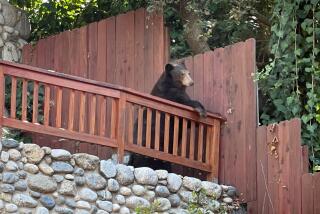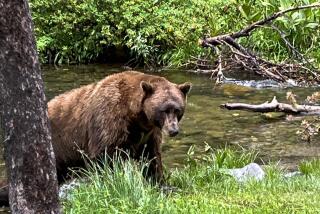Monrovia looks to curb bears’ trash-can dining
- Share via
Any trash can that can go nine rounds with Kobuck can certainly withstand the prying paws of Monrovia’s pesky black bears.
Kobuck, a 500-pound grizzly, is an ursine tester who resides in a nature center outside Yellowstone National Park. His purpose in life is to eat, sleep, educate tourists and pulverize waste containers.
BearSaver, an Ontario manufacturer of bear-proof waste cans, recently pitted Kobuck against its residential waste receptacle. Again and again and again.
“They kept bringing this thing back and bringing it back and bringing it back and it kept failing,” said Libby Scott, animal curator at the Grizzly and Wolf Discovery Center in Montana. “So it would go back for improvement and retesting” until they finally got it right.
In the end, the company produced a battle-tested, armored, rollout curbside trash can that looks much like any other, except for its steel reinforcement and patented self-locking lid.
For 90 minutes, Kobuck clawed, chewed, pounced and crushed the can, trying to extract fish inside. Exhausted, the bruin gave up, and the product passed the test. Now, the city of Monrovia says BearSaver trash cans are ready to take on suburban black bears in L.A. County.
Monrovia is a bear magnet. Homes press deep into canyons, particularly along Norumbega Drive, where bears find more food in pet dishes, orchards and trash cans than they do in the San Gabriel Mountains. Reports of bears in yards, pools and hot tubs are common.
“We have our fair share of bear problems,” said Jason Varner of the city’s Public Works Department. “The past couple weeks we’ve had one or two calls from residents saying bears are trying to get into the trash cans.”
Bears that get too cozy around people can become destructive nuisances or safety threats. Such encounters, if left unchecked, almost invariably lead to the destruction of the animal, wildlife officials say.
To prevent that, the Monrovia City Council last month indicated its willingness to proceed with widespread use of bear-proof trash cans in the most-affected neighborhoods. While no final decision has been made, city staff members are studying how to pay for and deploy the new waste bins under a pilot program.
About 3,000 of the “bear-resistant residential carts” are already in use in Wrightwood. Others are securely keeping garbage from the maws of bears in Alaska and Montana, said Steve Thompson, spokesman for BearSaver. He said Monrovia would be the first urban area to deploy the receptacles.
While the steel-reinforced hull of the can prevents bears from squashing it, Thompson said the self-locking lid is the key. Once the lid is firmly closed, only a human finger can reach in and depress the release switch.
“It’s fine for humans, but it can’t be done by animals,” said Monrovia spokesman Dick Singer.
But the can costs about $150, twice as much as a regular plastic roll-out bin. Monrovia officials, working with waste haulers, are trying to determine who will pay the extra cost.
Also, Scott said using the devices in one neighborhood, but not others, might cause bears to forage deeper into urban areas, where they would face more dangers with people and vehicles.
“If you have a neighborhood that has a problem and does something, and another neighborhood that doesn’t, the bears will move to the other neighborhood,” Scott said. “Is there a guarantee the bear will go back into the woods? Or will it go straight into the city? That could be a problem.”
Given that concern, Thompson said his company has begun talks with waste haulers in nearby Duarte about deploying the new cans. The Monrovia City Council is expected to consider a final proposal to start using the trash cans in January.
*
More to Read
Sign up for Essential California
The most important California stories and recommendations in your inbox every morning.
You may occasionally receive promotional content from the Los Angeles Times.













